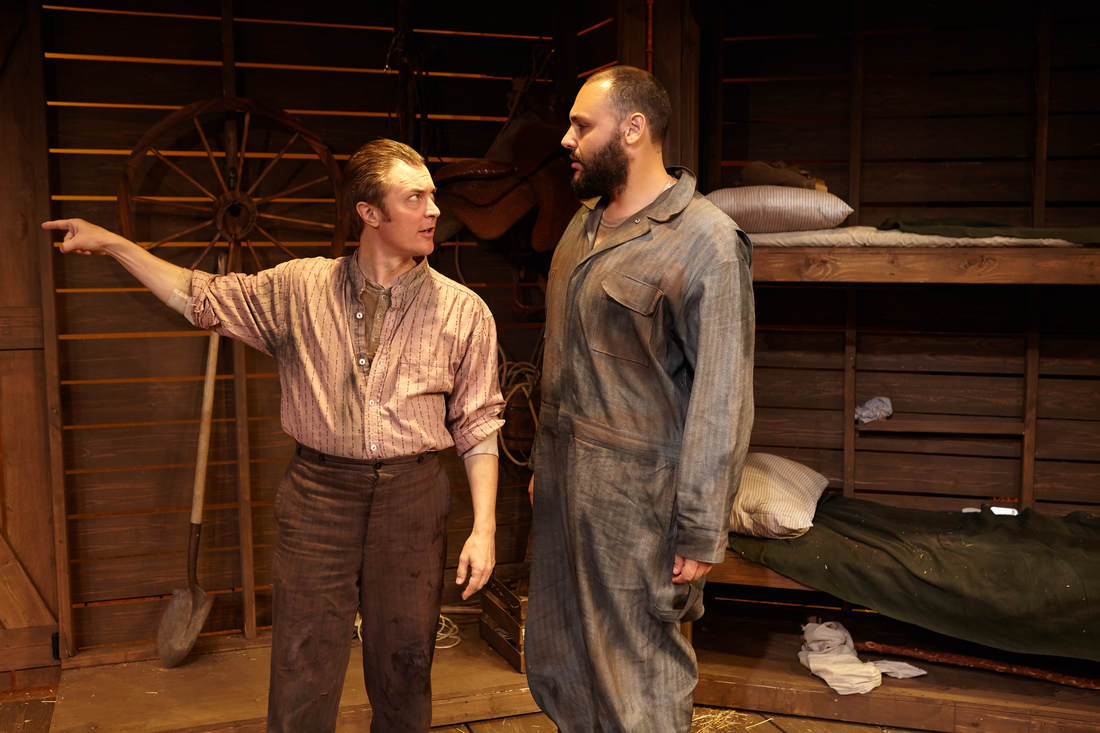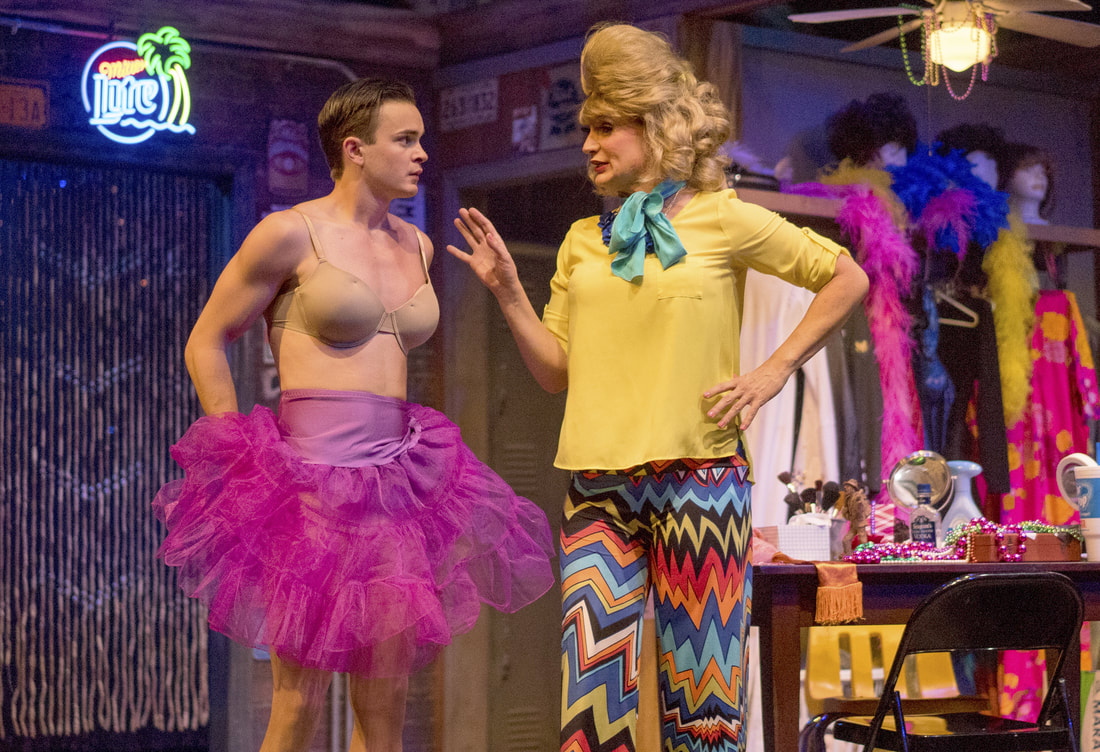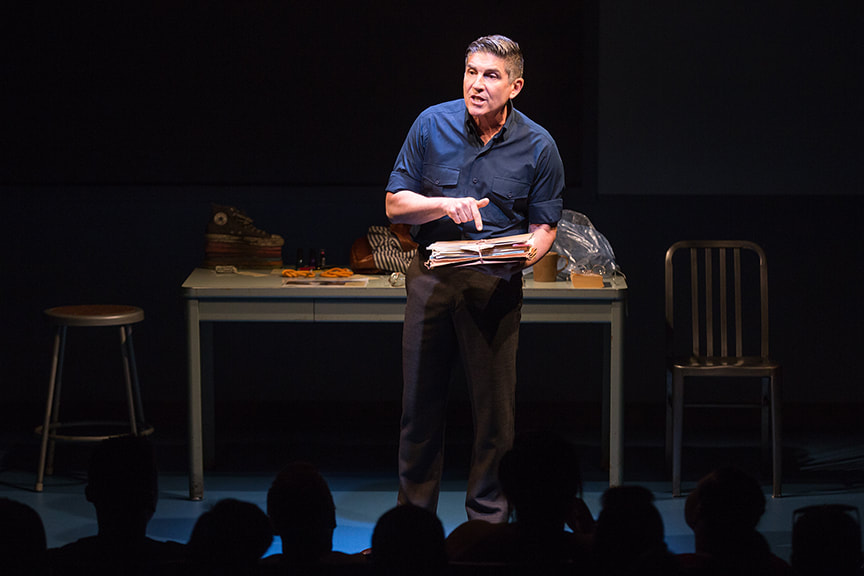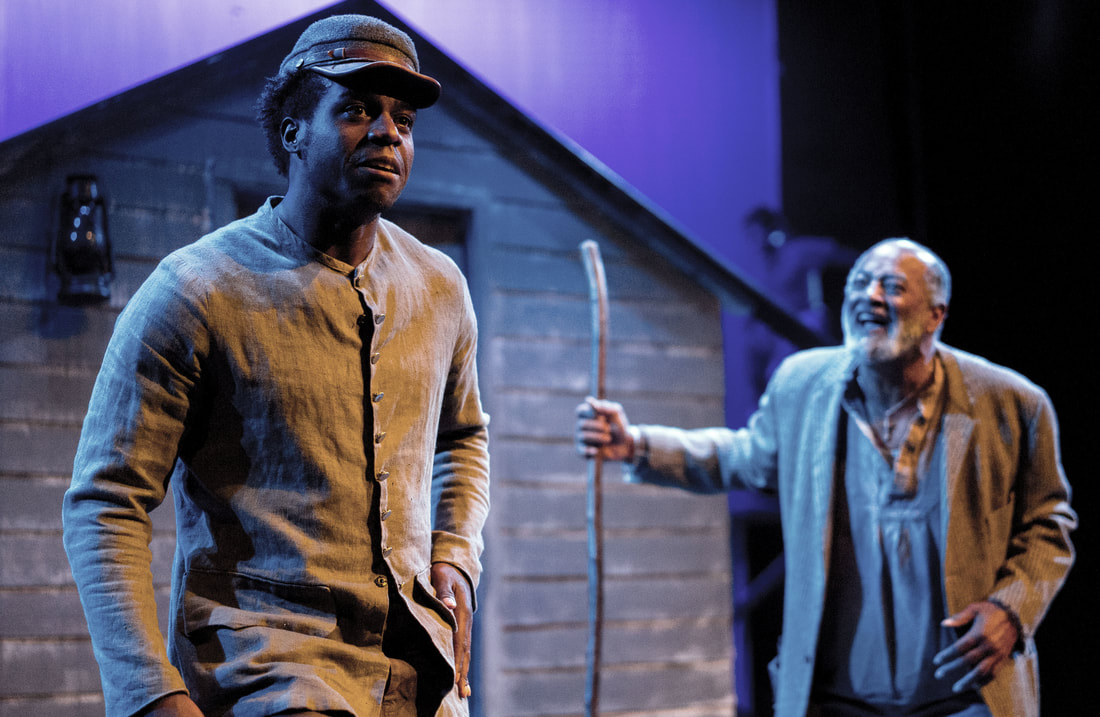|
Left to right: Dori Salois, Richard Rivera, Melanie McCorkle and William Parker Shore in "Clever Little Lies." Photograph courtesy of Point Loma Playhouse Infidelity is nothing to laugh about, but with Joe DiPietro’s 2013 comedy Clever Little Lies it’s hard to restrain yourself. At Point Loma Playhouse, where Jerry Pilato is directing a production that runs through Nov. 12, he actually offers a note in the playbill explaining that the play does not intend to offend but rather to treat the subject of cheating with a light touch. Whether that’s possible or not is a debate for another time.
The truth is, Point Loma’s Clever Little Lies is frequently funny. There are just enough edges – and mild profanities – in DiPietro’s script to elevate the material above the category of a safe, Neil Simonish approach to adult relationships. The story goes that middle-aged Bill (Richard Rivera) finds out from his son Billy (William Parker Shore) that the latter is cheating on his wife Jane (Melanie McCorkle). Billy’s motives seem flimsy and narcissistic from the start, so it’s hard to muster any understanding for him, especially when feisty new mom Jane seems like a real catch. The dramedy culminates with a visit by Billy and the unsuspecting Jane (along with their 3-month-old baby – heard but not seen) to the suburban digs of Bill and invariably blunt wife Alice (Dori Salois). While one secret is guarded during this bantering interlude, another is revealed, which keeps Clever Little Lies moving briskly forward. The intended focal point of the story is mother Alice, but it’s Rivera’s genuine and even vulnerable performance as father Bill that sells this story and holds it together, too.
0 Comments
Jacob Sidney (left) and Nicholas Mongiardo-Cooper in "Of Mice and Men." Photo by Aaron Rumley The stage adaptation of John Steinbeck’s “Of Mice and Men” may be just “the next best thing” to reading the 1937 novella, but it contains a dramatic potency all ifs own. Steinbeck’s words seamlessly transfer from one medium to the other, as does the lyricism of his statements about loneliness and about the hardest to comprehend of life’s tragic inevitabilities. As demonstrated by North Coast Repertory Theatre’s at-once brutal and understated production of the play (which also debuted in 1937, in San Francisco), the live action can heighten the anxieties of the storytelling and the truths inherent in Steinbeck’s discourse on humanity. The tension inside the theater at North Coast Rep, for example, is excruciating in the weighty moments precipitating the “mercy killing” of an old dog, and later, when the childlike goliath Lennie (Nicholas Mongiardo-Cooper) is alone with the flirtatious wife of a hothead ranch hand.
Director Richard Baird has conceived an adaptation that is startling in its sequences of violence, yet wistful and even tender in its depiction of two unlikely, Depression-era friends reaching for a shared dream: a little farm where the protective George (Jacob Sidney) and manchild Lennie can live off “the fat of the land.” This is a lengthy production (three acts, with an intermission) but a well-paced one true to the narrative’s ever-present apprehensions. While Sidney and especially Mongiardo-Cooper are outstanding, they are not alone in vividly inhabiting Steinbeck’s Salinas Valley ranch characters. John Greenleaf is affecting as the desperately hopeful old Candy, who longs to join George and Lennie in a better life somewhere. J. Stephen Brantley exudes all the goodness that is inside the laconic jerkline skinner Slim. Laurence Brown, as Crooks, the one black man on the ranch, richly embodies a figure who is, like Lennie, an outsider, and who most expresses the story’s undercurrent of loneliness. “Of Mice and Men” – the novella and the play – is 80 years old now, but it’s hard to imagine a time when its view of a world both merciless and merciful won’t matter. (Review originally published in San Diego CityBeat on 10/25/17.) Claudio Raygoza in "Sex, Drugs, Rock & Roll." Photo by Daren Scott The atmosphere in little ion theatre is choked with testosterone and angst in its presentation of Eric Bogosian’s one-man show Sex, Drugs, Rock & Roll. Part of ion’s “Double Dare” rotating repertory with E.M. Lewis’ The Gun Show, SDR&R stars ion’s executive artistic director, Claudio Raygoza, who immerses himself in 10 characters living and ranting during the post-Reagan/Daddy Bush era. His is a manic, chameleonic performance of admirable stamina, though much of the subject matter comes off as dated, even anachronistic by the standards of today’s faster paced, social-media-driven society.
Tellingly, most of the laughter in the audience came from the male contingent, as Sex, Drugs, Rock & Roll preoccupies itself to a considerable extent with the frustrations and anxieties of those men perpetually trapped between neurosis and machismo. (Review originally published in San Diego Citybeat on 10/11/17.) James Lecesne in "The Absolute Brightness of Leonard Pelkey." Photo by Jim Cox James Lecesne’s one-man show The Absolute Brightness of Leonard Pelkey succeeds on multiple levels. It’s a murder mystery presided over by a hardboiled Jersey shore detective who’s more sensitive than he lets on. It’s a character study of an eccentric yet typically American community where, when all is said and done, people care for each other. Most profoundly, it’s a story about the need to accept, to even love, people for what they are.
In the 80-minute performance based on Lecesne’s 2008 young-adult novel “Absolute Brightness,” he portrays nine characters, from a precocious teen girl to the elderly man who runs a clock shop. They’re all deeply impacted one way or the other by the ultimately discovered hate-crime murder of a 14-year-old boy named Leonard Pelkey who lived among them and in a short time touched their lives. A gay boy who wore rainbow-colored sneakers, donned fairy wings in a production by the Buddy Howard School of Drama and Dance, and advised the local ladies on their hair and clothes, Leonard was proudly who he was. A dreamer with a generous heart, he saw the adults around him, one townsperson recalled, not as how they were but how they hoped to be. Lecesne’s seamless embodying of these individuals’ full idiosyncratic selves is impressive on its own, but he also deftly enacts conversations between them without the distracting awkwardness of trying to switch on a dime from one persona to another. Furthermore, his script balances the gravity of the town murder and the subsequent grief with the delightful quirks of some of the citizens detective Chuck Desantis interviews – Otto Beckerman the clock man, the binoculars-wielding mob widow Gloria Salzano, and chainsmoker Marion Tochterman, to name three. Lecesne is a co-founder of the Trevor Project, a suicide prevention helpline for LGBTQ youth that is named for his earlier one-man show Word of Mouth. The Absolute Brightness of Leonard Pelkey, directed by Tony Speciale, has much to say about being true to oneself and about tolerance, reminders that should reside in every American town, today more than ever. (Review originally published in San Diego CityBeat on 10/11/17.) Alexander Guzman (left) and Jacob Caltrider in "Homos, or Everyone in America." Photo by Jim Carmody Jordan Seavey’s Homos, or Everyone in America takes a worldview, or at least an America-view, of the complexities of gay relationships. But it is the one between The Writer and The Academic (otherwise unnamed) that is most compelling about this play. In Diversionary Theatre’s West Coast premiere of Homos, Jacob Caltrider and Alexander Guzman deliver skilled, vulnerable performances as lovers in Brooklyn navigating the sexual thrills of being together as well as the doubts, anxieties and flare-ups that make all relationships, gay or straight, not for the timid. If anything, Seavey packs too many dramatics into his rapidly paced one-act play, which wavers back and forth between the past and the present of the lovers’ relationship. Yet from start to finish, it’s a rewarding trip in time. (Review originally published in San Diego CityBeat on 10/4/17.)
Wrekless Watson (left) and Antonio TJ Johnson in "Father Comes Home from the Wars." Photo by Daren Scott “Hero” is an intentionally conflicted name for the protagonist of Intrepid Theatre Company’s lyrical staging of Suzan-Lori Parks’ Father Comes Home from the Wars. The three-act, three-hour drama follows Hero (a very intense Wrekless Watson) over the course of two years during America’s Civil War -- from slave, to soldier indentured by his cruel owner (Tom Stephenson) to his returning home to West Texas. Through Hero, a complicated man who has both caused hurt and been hurt, the elusive dream of freedom aches to be made real.
While beautifully brought to life by a cast that also features Cortez L. Johnson, Antonio TJ Johnson and Leonard Patton, whose vocals accompanied by guitarist Jim Mooney enhance the sweeping production’s resonance, Father’s three acts are uneven. The first is the strongest, with all of Hero’s internal and external conflicts at the fore. The second act feels long, although it’s a tour de force for Stephenson. The third act, which includes everything from Hero’s talking dog to a near-killing, is tonally at odds with itself. Though Hero, too, is a man at odds with himself as he tries to embrace a new life. In the end, the horrors of war and slavery are rightfully indicted, and racism is shown for what it is: inhuman. (Review originally published in San Diego CityBeat on 10/4/17.) |
AuthorDavid L. Coddon is a Southern California theater critic. Archives
July 2024
Categories |
David Coddon |
|






